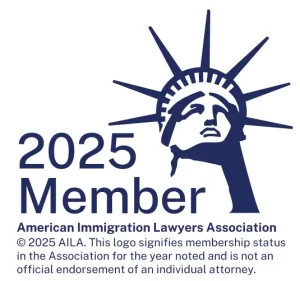When the U.S. government grants you a humanitarian immigration benefit—whether asylum, Special Immigrant Juvenile Status (SIJS), or another form of protection—that benefit is based on specific facts about your situation. What many people don’t realize is that your actions after approval can destroy the very benefit you worked so hard to obtain.
This article examines a critical principle that applies across multiple humanitarian immigration programs: your conduct after receiving immigration relief must remain consistent with the basis on which that relief was granted. We’ll focus on two common scenarios where beneficiaries unknowingly jeopardize their status—asylum recipients returning to their home countries and SIJS beneficiaries reuniting with their parents.
Understanding the Foundation: Why Basis Matters
Humanitarian immigration benefits aren’t granted casually. Each one requires you to prove specific circumstances:
- Asylum: You were persecuted or have a well-founded fear of persecution based on race, religion, nationality, political opinion, or membership in a particular social group
- SIJS: A state court determined that reunification with one or both parents is not viable due to abuse, neglect, abandonment, or similar circumstances, and returning to your home country is not in your best interest
These aren’t just procedural requirements—they’re the legal foundation of your entire case. When you receive approval, the government is saying: “Based on these specific circumstances, we’re granting you protection.”
The problem arises when your later actions contradict those circumstances.
The Asylum Trap: Why Returning Home Can Cost You Everything
How Asylum Works
When USCIS grants you asylum, it’s based on your claim that you cannot safely return to your home country. The government accepts that you face a credible threat of persecution and provides you with protection, work authorization, and eventually a path to permanent residence.
The Danger of Going Back
Many asylees feel drawn to return home for compelling reasons:
- A parent or family member is seriously ill
- They need to handle property or business matters
- Political conditions seem to have improved
- They simply miss their home and family
But returning to your home country can trigger asylum termination proceedings.
The Legal Standard
Under federal regulations at 8 CFR § 208.24, USCIS may terminate your asylum status if it determines you have “voluntarily availed yourself of the protection of the country of your nationality.”
When you return to the country you fled, immigration authorities may conclude:
- Your fear of persecution was not genuine
- Conditions have changed sufficiently that you no longer need protection
- You obtained asylum through misrepresentation
Real-World Consequences
Immigration officers examine several factors when an asylee returns home:
- Whether the return was voluntary
- How long you stayed
- Whether you obtained or renewed a passport from your home country
- Whether you took steps to re-establish yourself there (buying property, starting a business, etc.)
- Your explanation for the return
Even a single trip can raise questions. When you later apply to adjust status to permanent residence or naturalize as a U.S. citizen, USCIS can reopen your asylum case based on evidence that you returned home.
The Naturalization Risk
The risk doesn’t disappear once you get your green card. When you apply for U.S. citizenship—which requires listing all international travel—a USCIS officer can question whether your original asylum claim was fraudulent if they discover you returned to your home country. This can result in:
- Denial of naturalization
- Revocation of your green card
- Removal proceedings
The SIJS Parallel: When Reunification Contradicts Your Case
What SIJS Is Based On
Special Immigrant Juvenile Status provides a path to lawful permanent residence for children who have been abused, neglected, or abandoned. The statutory requirements at INA § 101(a)(27)(J) include a state court finding that reunification with one or both parents is “not viable.”
This isn’t simply a statement that the parents live far away or in another country. It’s a legal determination that the parent-child relationship has been fundamentally damaged by abuse, neglect, or abandonment to the point where reunification cannot appropriately occur.
The Automatic Revocation Rule
Federal regulations at8 CFR § 204.11(j)(1)(i) contain a harsh consequence: if you reunify with your parents after SIJS approval but before your green card is granted, your approved petition is automatically revoked. There’s no hearing, no appeal—the approval simply disappears.
Where You Meet Doesn’t Matter
Some SIJS beneficiaries think they can safely see their parents if they meet outside the United States. This is a dangerous misconception. Reunification is problematic regardless of location:
Meeting in the U.S.: If your parents can visit you in the United States, it suggests the relationship is intact and reunification is viable.
Traveling to your home country: This demonstrates you can safely return home and reunite with your parents—contradicting two key findings in your SIJS case.
Meeting in a third country: Even a neutral location proves you maintain an active relationship with your parents and can reunite with them.
All three scenarios undermine the legal basis of your SIJS approval.
The Interview Problem
Current processing shows a multi-year backlog for SIJS adjustment of status cases. When your turn finally comes and you attend your USCIS interview, you’ll face detailed questioning about:
- Your current relationship with your parents
- Whether you’ve had contact with them since your SIJS approval
- Whether circumstances have changed
If you’ve reunited with your parents, you face an impossible choice:
- Tell the truth → Your application will likely be denied because reunification turned out to be viable
- Lie about the contact → You commit fraud, which is a permanent bar to immigration benefits under INA § 212(a)(6)(C)
The Permanent Parental Bar
SIJS comes with another significant consequence that illustrates how seriously the law treats the reunification requirement: even after you become a U.S. citizen, you can never petition for either parent to receive immigration benefits.
This is true even if only one parent was abusive and the other did nothing wrong. Congress wrote this rule specifically to ensure that parents who harmed their children cannot benefit from their children’s SIJS status. It reinforces that SIJS is premised on a fundamentally broken parent-child relationship.
The Common Thread: Actions Must Match Your Basis
Why This Principle Exists
Both asylum and SIJS are discretionary humanitarian benefits. The government doesn’t have to grant them—it chooses to based on your specific circumstances. When your conduct contradicts those circumstances, it suggests:
- Your original claim may have been exaggerated or false
- Your circumstances have fundamentally changed
- You don’t actually need the protection the benefit provides
The Fraud Investigation Context
Immigration authorities are increasingly vigilant about fraud in humanitarian programs. A July 2025 USCIS report documented significant fraud concerns in the SIJS program, including cases involving misrepresentation of circumstances and relationships. Similar concerns exist with asylum cases.
When you act inconsistently with your approved benefit, you trigger heightened scrutiny. Officers are trained to look for indicators that the original petition was not meritorious or that circumstances have changed.
Practical Guidance: Protecting Your Status
For Asylum Recipients
Before you have a green card:
- Avoid traveling to your home country except in the most extraordinary circumstances
- If you must travel for a genuine emergency, consult an immigration attorney first
- Be prepared to provide detailed documentation and explanation
- Consider whether the risk of losing asylum outweighs the reason for travel
After getting a green card:
- Understand that travel to your home country can still raise questions during naturalization
- Maintain documentation showing why any return trip was necessary and how you stayed safe
- Be prepared to explain any travel when you apply for citizenship
Always:
- Use aRefugee Travel Document (Form I-131) if you need to travel internationally
- Never renew or obtain a passport from the country of persecution without legal guidance
- Keep detailed records of your circumstances and any changes
For SIJS Beneficiaries
Before your green card is approved:
- Do not meet with your parents in any location
- Do not maintain regular contact that could be characterized as “reunification”
- Document any unwanted contact attempts by parents
- Understand that the wait for visa availability does not change these restrictions
During your adjustment interview:
- Answer all questions truthfully
- Be prepared to explain the current status of your relationship with your parents
- Provide any documentation showing changed circumstances only if they genuinely exist
After getting a green card:
- Consult with an immigration attorney before considering any parental contact
- Understand the permanent consequences (inability to petition for parents)
The Underlying Principle for All Humanitarian Benefits
Your actions after approval must be consistent with the basis on which you were granted the benefit. If your conduct contradicts that basis, you risk losing the benefit entirely.
This applies whether you have asylum, SIJS, Temporary Protected Status, or other humanitarian relief. Each benefit has its own specific rules, but they all share this fundamental principle.
When Circumstances Genuinely Change
Sometimes circumstances do legitimately change after a benefit is granted:
- Political conditions improve in your home country
- Family relationships heal over time
- The situation that prompted your application resolves
If this happens, you should consult an immigration attorney about the implications. Depending on your specific benefit and timing, there may be safe ways to address changed circumstances. However, acting without legal guidance can be catastrophic.
The Cost of Inconsistent Conduct
The consequences of contradicting your immigration benefit’s basis can include:
- Revocation of approved petitions or status
- Denial of pending applications for adjustment or naturalization
- Fraud findings that permanently bar future immigration benefits
- Removal proceedings that could result in deportation
- Loss of work authorization and the ability to support yourself
- Years of wasted time and effort rebuilding your immigration case
Conclusion: Protecting What You’ve Earned
Receiving a humanitarian immigration benefit is often the culmination of a difficult journey. You’ve proven your case, provided evidence, and received approval. But that approval isn’t unconditional—it requires you to maintain consistency with the circumstances that justified the benefit in the first place.
Whether you have asylum, SIJS, or another form of humanitarian relief, remember:
- The government can and does scrutinize post-approval conduct
- Actions that contradict your original basis can destroy your benefit
- The emotional pull to return home or reunite with family must be weighed against legal consequences
- When in doubt, consult an immigration attorney before taking any action that might raise questions
Your humanitarian immigration benefit is valuable and hard-won. Protect it by ensuring your conduct remains consistent with the basis on which it was granted.
If you have questions about protecting your humanitarian immigration status, or if you’re concerned about whether past actions may have jeopardised your case, contact an experienced immigration attorney for guidance. The stakes are too high to risk your immigration future on assumptions.

